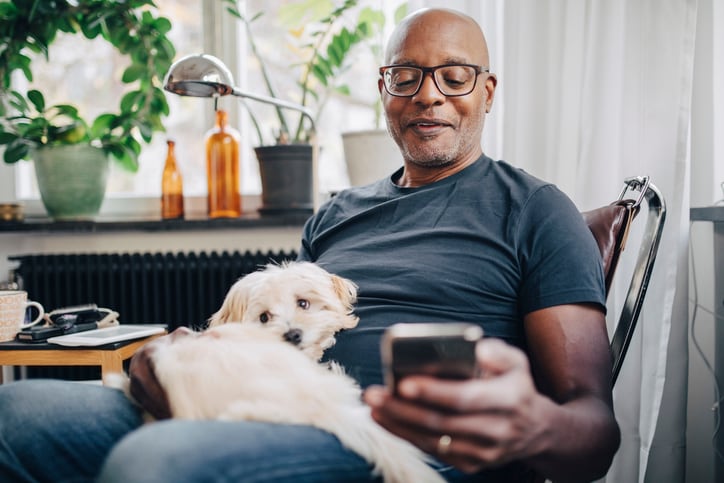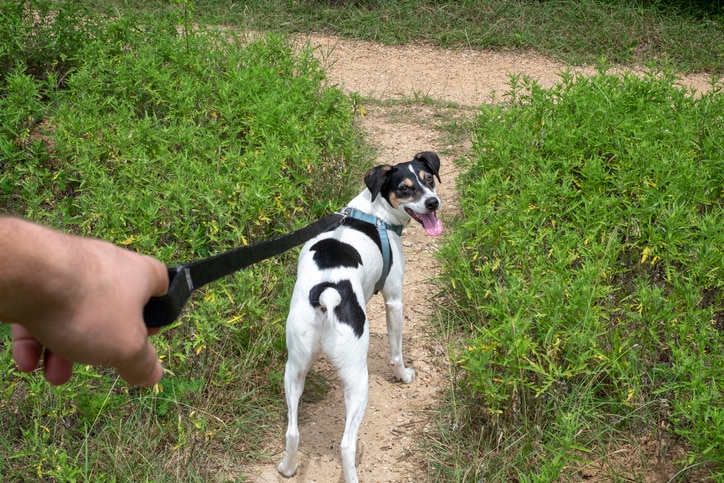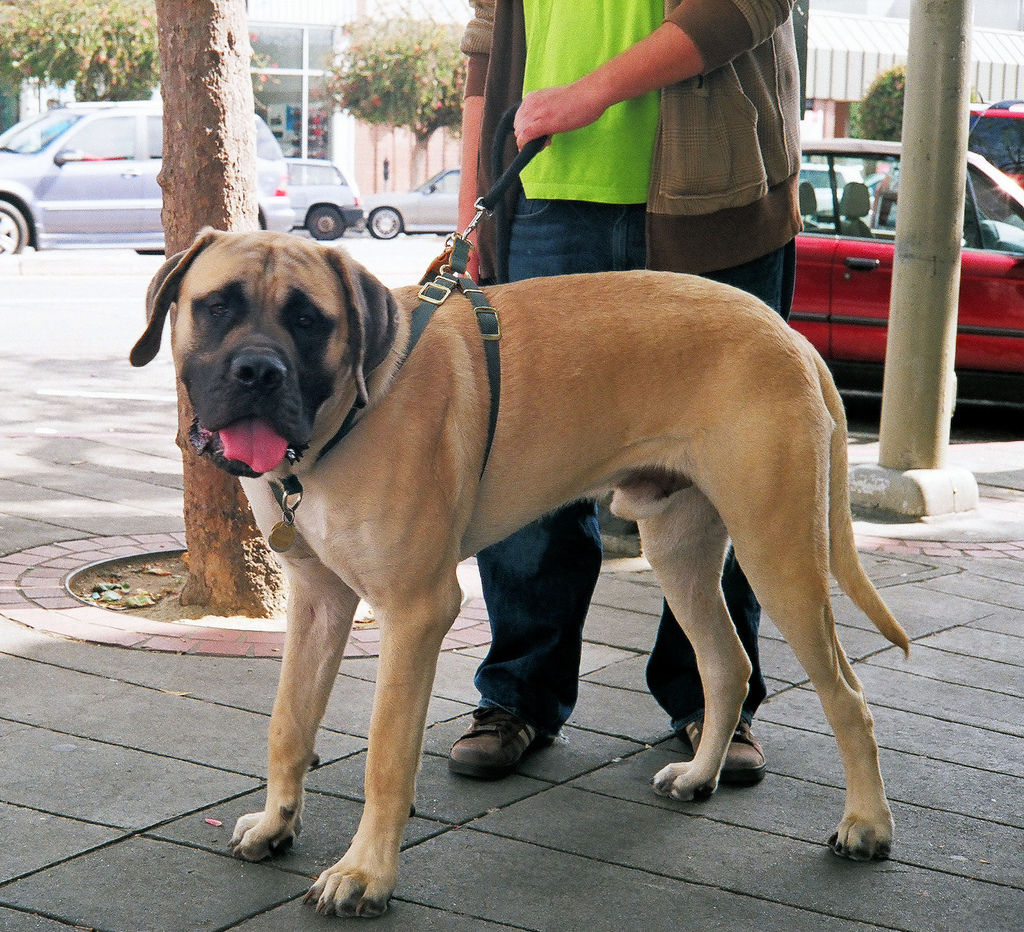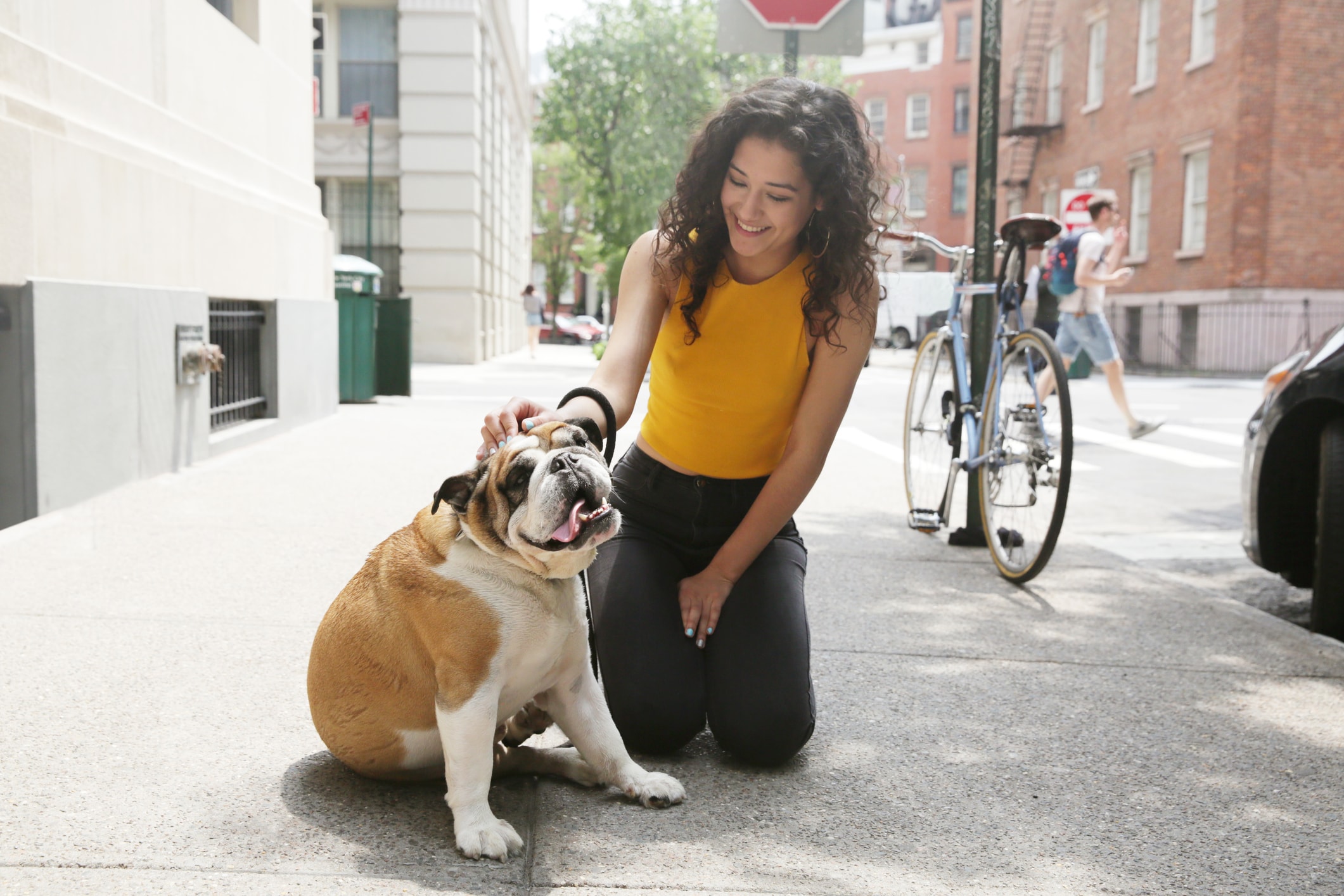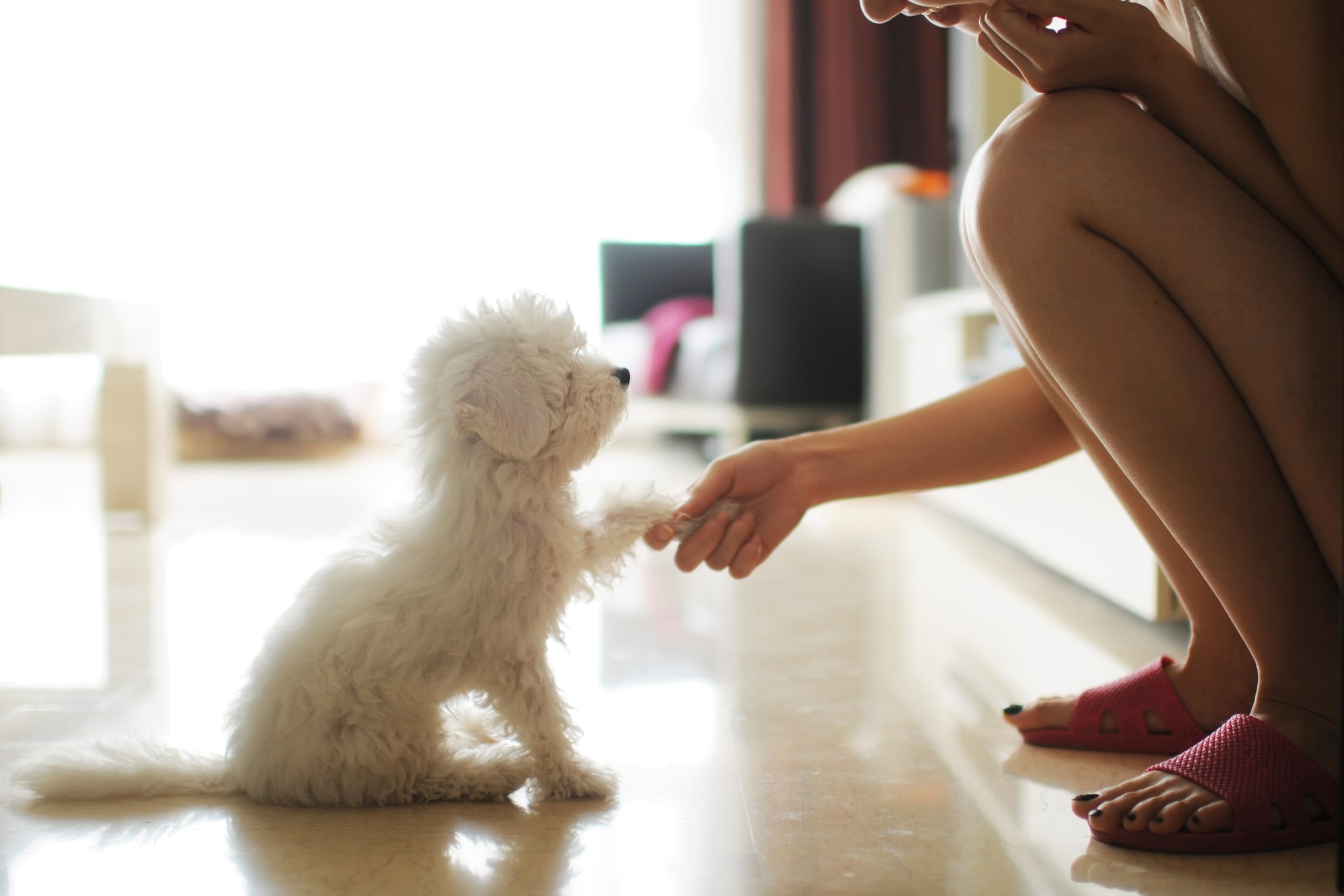From encouraging a regular exercise routine to reducing feelings of loneliness, there are many benefits of owning a pet for seniors. But before deciding to get a dog, there’s a lot more for older adults to consider than just potential names for their new companion.
“As the aging population increases and pet-friendly facilities expand, it’s so important to minimize the opportunity for seniors to make mistakes when getting a dog,” says Harrison Forbes, a dog trainer, animal behaviorist and bestselling author of “Dog Talk” based in Nashville, Tennessee. “For example, if you get a dog that can cause a trip and fall, it can be devastating. But the right dog can absolutely extend life for widowers or seniors who live alone.”
This is why it’s so important for seniors to understand not only what owning a dog entails, but how to find the right pet, which goes beyond simply researching the most popular dog breeds, according to veterinarians and canine behavioral experts. Here, they share top dog breeds for seniors, as well as explain how to help seniors find their perfect companion.
Key takeaways
- Seniors can greatly benefit from having a dog, but choosing the right one requires careful consideration of lifestyle, mobility and future needs. Matching a dog’s temperament, size, and energy level to the owner is more important than picking a popular breed.
- Experts recommend several senior-friendly breeds — from Cavaliers and Maltese to greyhounds and older retrievers—while cautioning against giant or high-energy “workaholic” breeds. The best fit often comes from looking at individual personality and adopting adult or senior dogs, not just puppies.
- Before getting a dog, seniors should evaluate activity level, physical limitations, financial preparedness, living arrangements and how much time they can devote to training and care. A thoughtful, personalized approach helps ensure safety, compatibility and a rewarding long-term bond.
What are the best dog breeds for seniors?
So, what type of dog should a senior get? While some breeds might be better choices in general, so much is dependent on the individual dog and personal preferences of the owners, explains Steve Dale, a certified animal behavior consultant based in Chicago. That said, there are a few breeds he would never suggest for a senior, including the Irish wolfhound or Great Dane, which are known as “giant breeds” due to their massive size.
“Also, an energizer bunny dog — some of the herding breeds, such as a border collie or Australian cattle dog — may not be a good idea,” he says. “These are examples of canine workaholics who require a job and active lifestyle.”
As for the best dog breeds for seniors? From size to temperament, exercise needs to trainability, here are the top breeds to consider, according to experts:
1. Cavalier King Charles spaniel

Affectionate, calm and easy-going are the top three traits that describe the Cavalier King Charles spaniel making it the most popular small dog breed recommendation for seniors among our experts. “The best of all worlds: a lap dog, a calm dog, a playful dog who can retrieve little toys indoors,” Dale says. They can also go on longer walks or be just as content indoors with their favorite people, he says.
Due to their temperament, affectionate Cavaliers also tend to have a strong bond with their owners and are easy to train, adds Sally Grottini, a canine behavior expert for JustAnswer with over three decades of experience based in Danville, Pennsylvania.
2. Maltese
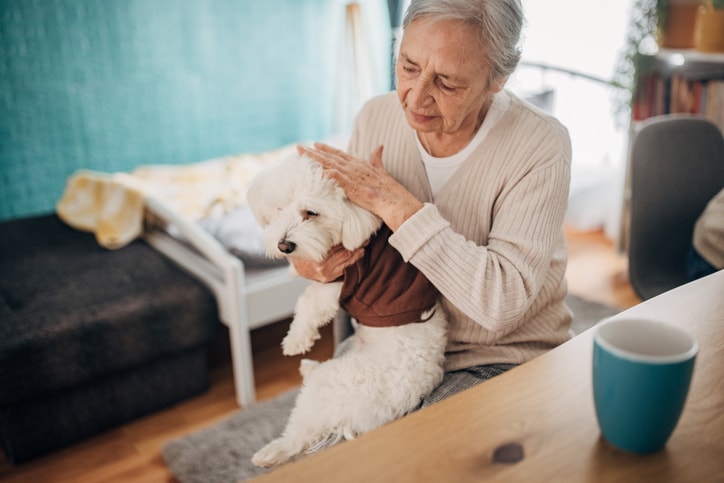
For less active seniors looking for a loving companion who is all about cuddling up for hours on end, Dr. Christa Kahuda, owner and medical director at Charleston Harbor Veterinarians in Charleston, South Carolina, recommends the Maltese who she describes as calm and quiet, yet social.
“A Maltese is another affectionate smaller dog that is a lap hugger and does not require lots of exercise,” Grottini adds. While they do require grooming once a month, their small size — less than 7 pounds — makes a trip to the groomers less of a hassle for seniors.
3. Bichon frise
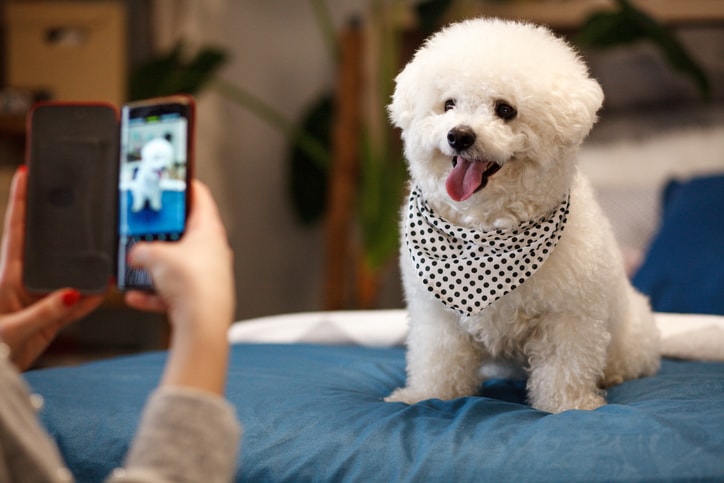
For seniors looking for a small dog that is easy to train, look no further than the bichon frise. These adorable little dogs love to please their owners and love to be the center of your attention, Grottini says. “They pick up training cues very quickly, especially when they are treat-trained,” she says. The bichon’s size would be a great fit for seniors living in an apartment, Grottini adds, but keep in mind that they do require grooming once a month like the Maltese.
4. Pomeranian
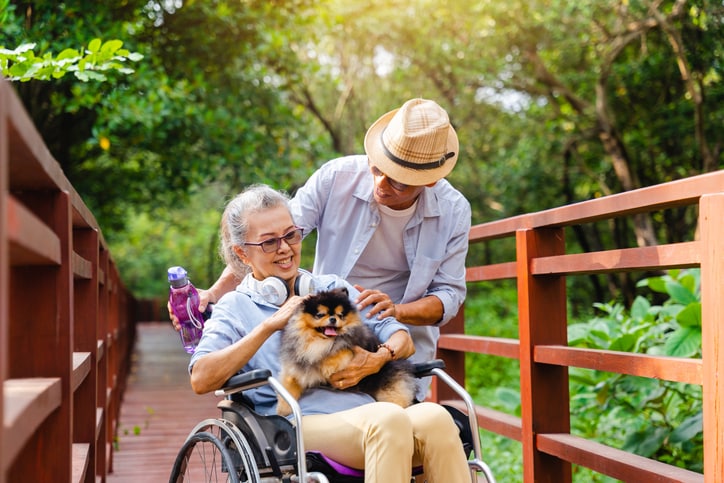
Weighing only 3–7 pounds on average, the Pomeranian is classified as a toy breed, which means its tinier than most. Because of its size, it’s a good fit for seniors living in an apartment, but experts do not recommend a pom for seniors susceptible to falls, “The Pomeranian is active, but is more than happy staying indoors,” according to Grottini, making it a good match for seniors with a less active lifestyle.
5. French bulldog
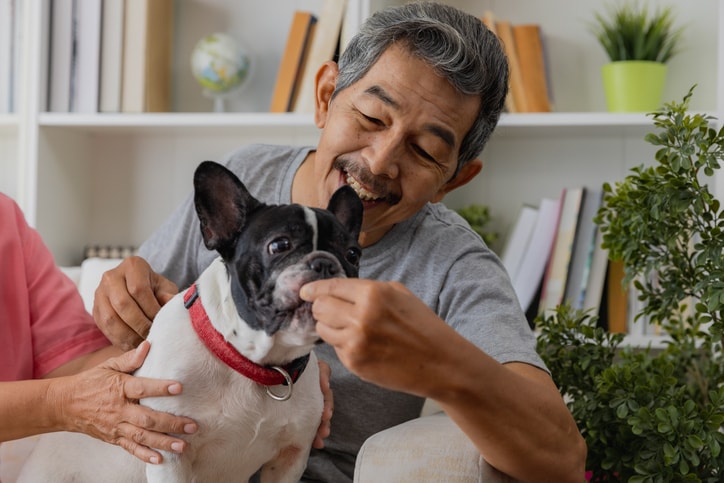
Looking for a dog to light up your life with a bit of laughter? “I suggest that Frenchies are the Jimmy Fallon of the dog world,” Dale says. “They’re funny and enjoy the attention they get when we laugh.” While a healthy Frenchie does require some walking, Dale says, they’re not a dog who needs a lot of outdoors time.
In fact, they should only spend a short amount in very hot weather since they are at risk of breathing difficulties as a brachycephalic breed, which is something to keep in mind if you live in a tropical climate.
6. Japanese chin
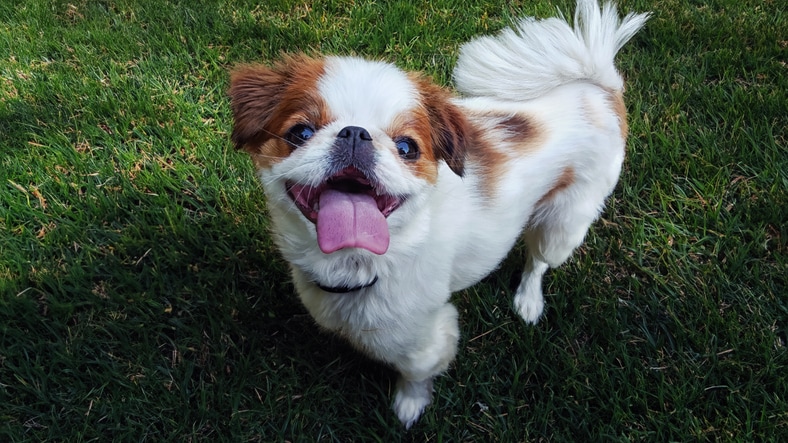
Slightly larger than the fluffy pomeranian, the Japanese chin is another toy breed that loves a good afternoon spent curled up in your lap. While their coat does require some care, Dale says, they have wonderfully balanced personalities. “They are a great hybrid — a playful dog when you want, but also a calm dog who is a royal cuddler,” he says.
7. Havanese
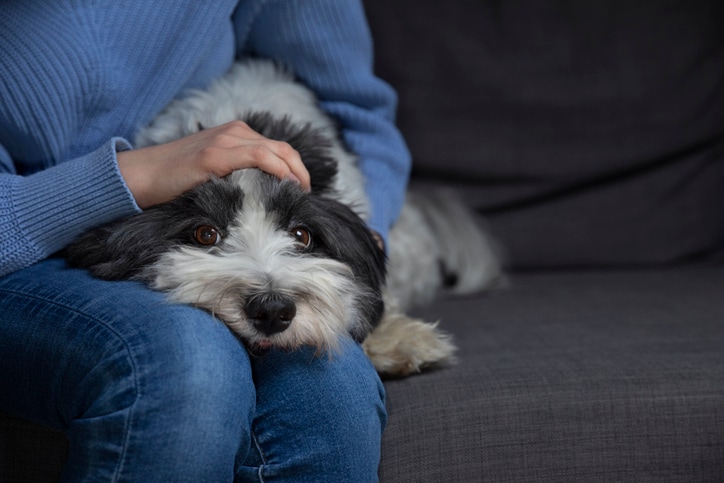
Another great fit for seniors living in a city or apartment is the long-haired Havanese. This small dog with a big personality is known for being quick with tricks and putting on a show. “Once little circus dogs, they still like to perform for their people to this day,” Dale says. The Havanese is sweet and gentle, but daily brushing is required.
8. Chinese crested
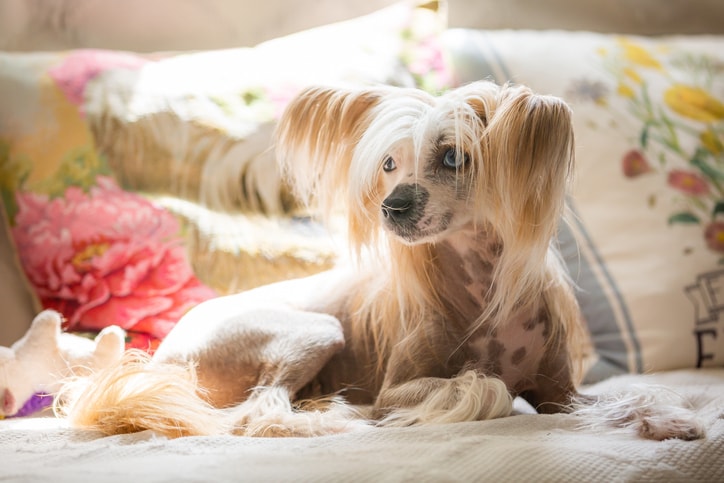
Looking for a dog for seniors that doesn’t shed? Look no further than the Chinese crested, a toy breed known for its spotted pink skin and playful personality. There are two varieties of cresteds: a hairless variety and a thin-coated variety called the “powderpuff.” Both, however, are master snugglers, according to Dale.
“This hairless or nearly hairless breed likes the warmth of your body and snuggling under the covers at night,” he says. In terms of activity, cresteds are similar to the cavalier as they appreciate a good walk, but they don’t need one daily, Dale adds.
9. Greyhound
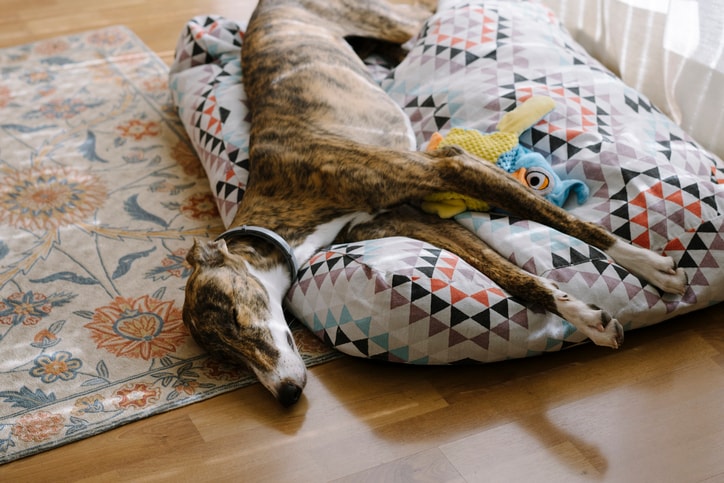
For seniors with a lifestyle best suited for a large dog breed, the greyhound is top of the list. “The truth is if you have a yard for this dog so they can expend energy once daily, they are otherwise couch potatoes,” Dale says. They love to hang out indoors with their owners and don’t demand tons of affection or attention, though they appreciate some for sure.
10. Whippet
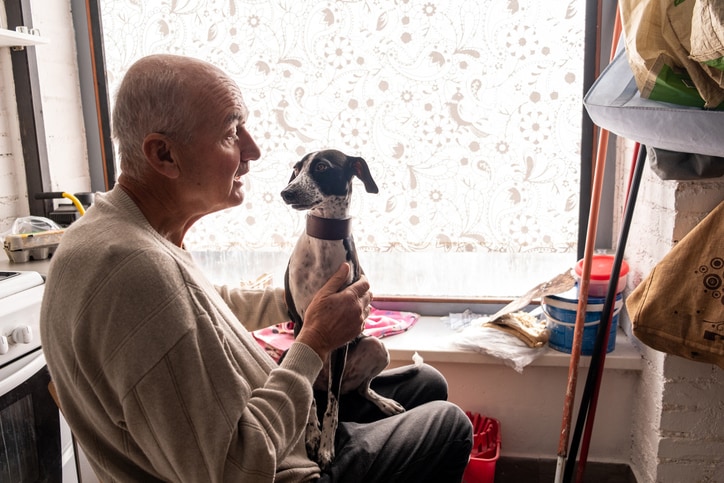
Not quite sure your house can handle the size of a greyhound? Meet the whippet. This smaller breed looks like a greyhound but in miniature form, making a smaller home and fenced-in yard more suitable.
Whippets will need to get out a few bursts of energy each day, but otherwise, they love to lounge indoors, Dale says. “This underappreciated breed acts in some ways like a cat,” he says. “Loving but not all over you all the time.”
11. Golden retriever (senior or adult)
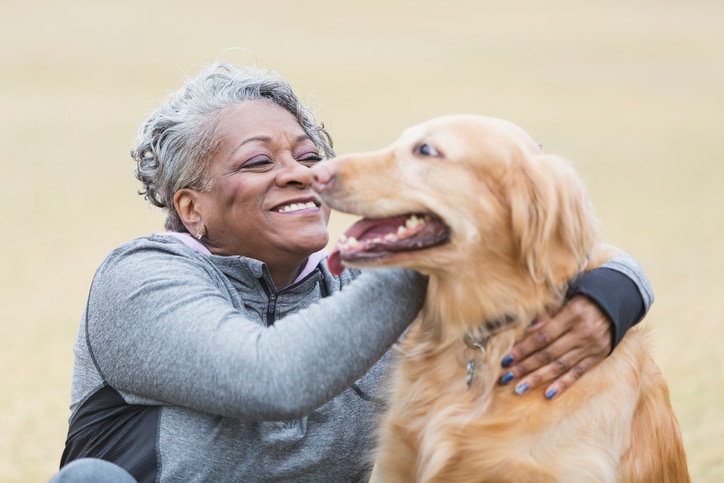
For seniors looking for emotional support when it comes to a canine companion, the golden retriever is a wonderful large breed option, according to Grottini. “They are in tune with their owner, loving, affectionate and easy to train,” she says.
Adult and senior golden retrievers also adapt well to new situations, which makes going home with a new owner easier in many cases. Keep in mind goldens do need exercise though — if you like to walk or toss a ball in the yard, they should do well, Grottini says.
12. Labrador retriever (senior or adult)
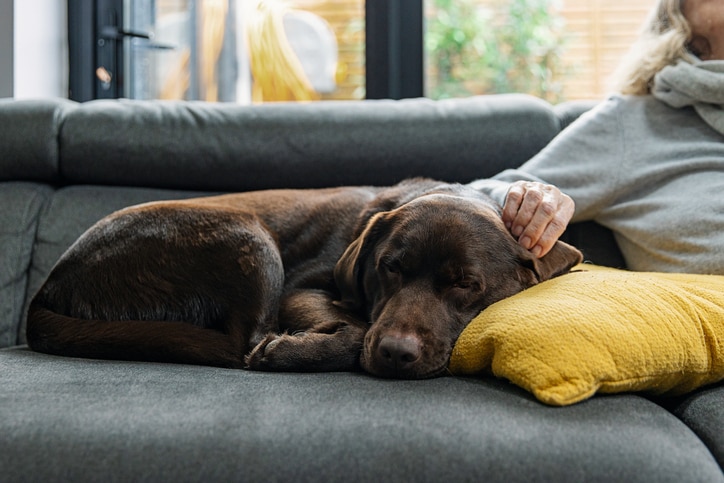
The loyal labrador retriever is a great large breed to consider for seniors looking for a dog to encourage a more active lifestyle, such as a daily walking routine, according to Kahuda.
Older labs can also get by with a mind-stimulating toy such as a treat dispensing ball if you cannot walk or play with them for a day, which is a perk, Grottini says. “They are also able to pick up on their owner’s emotional needs,” Grottini says, noting that labradors are used to treat post-traumatic stress disorder (PTSD) in soldiers and first responders.
13. Poodle
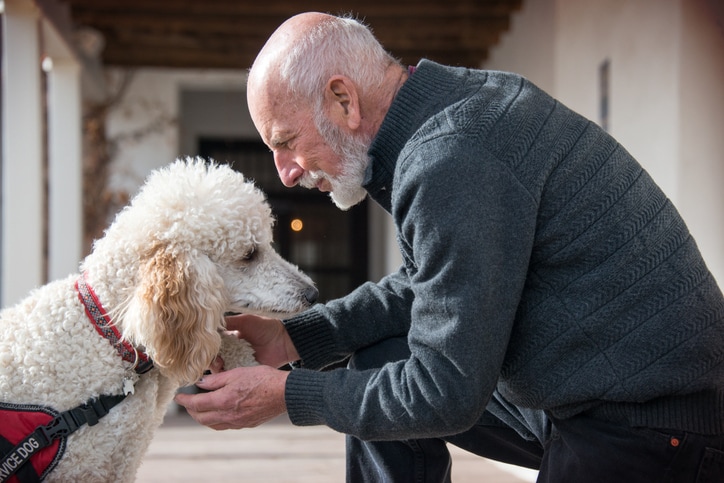
Another breed that encourages an active lifestyle is the versatile poodle, which comes in three size varieties: standards (15 inches tall), miniatures (under 15 inches tall), and toys, which stand no more than 10 inches tall. No matter the size, all poodles are known for their intelligence and ability to adapt to new situations well, according to Grottini.
They are also usually calm and develop loving bonds with their owners, she says. Extra perks include a hypoallergenic coat great for seniors that may have allergies.
14. Irish setter
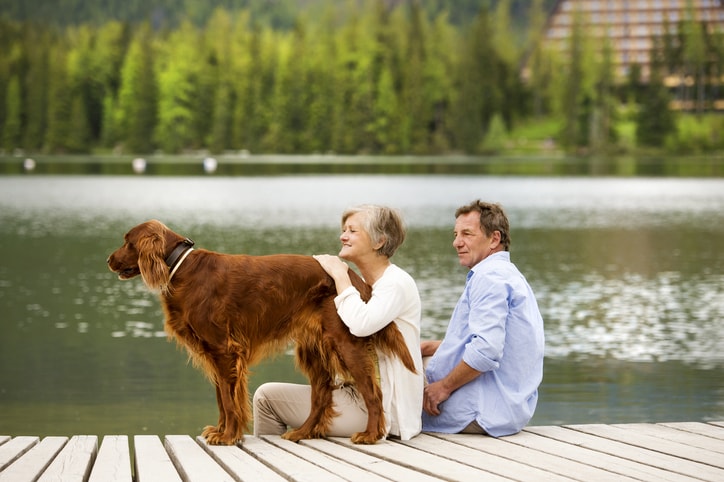
For active seniors who also often find themselves entertaining grandchildren with boundless energy, the Irish setter could be a wonderful addition to the family. This large sporting dog breed is known to be sweet tempered and great with young children. Older adults can also find a wonderful hiking or walking companion in the setter, according to Kahuda, as Irish setters need an active owner who can provide plenty of exercise.
15. Vizsla (senior or adult)
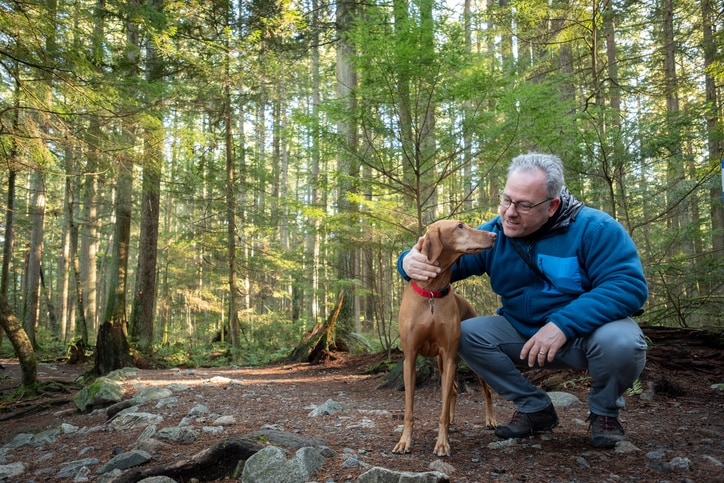
While the stamina of a young vizsla would be too much for older adults, this breed has many characteristics that can make it ideal as they age for the right active senior, according to Kahuda. Famous for forming tight bonds with their owners, vizslas hate to be left alone, making them great dogs for homebodies who are committed to a regular exercise routine, whether it be jogging, biking or walking outdoors in their community or neighborhood. With that in mind, vizslas are best suited for a home surrounded by wide open spaces to roam rather than city streets.
What should seniors consider before getting a dog?
The best dogs for seniors are the ones that are selected specifically to fit their lifestyle, explains Forbes, who regularly works with dog owners in their 70s and 80s. “Choosing the best dog transcends breed and fits better with the idea of ‘lifestyle matching,’” he says. “Plus, 80% of dogs in shelters are mixed breed so it really is about finding a personality match.”
With that in mind, Forbes recommends that seniors write down details of their current lifestyle, as well as what it may look like in a few years, before reaching out to a shelter. Beginning the process with that list will help ensure you are not swayed by an adorable — yet far too energetic — puppy in the window that may not be best suited for your situation.
Here, experts share the top lifestyle factors for seniors to consider before getting a dog:
Breed requirements of the community they live in — or plan to live in
“I often recommend mixed breeds and rescues for seniors,” explains Kahuda. But many senior living facilities do not allow certain dog breeds, she notes, which is why breed is still an important factor to consider when getting started. “Many breed-specific rescues have adults and seniors that could be great companions,” she says.
Also, when it comes to current living arrangements, Kahuda notes that if grandchildren frequent a senior’s home or facility, choosing a kid-friendly dog breed would also become a requirement to ensure visitors and neighbors stay safe.
Daily exercise routine and activity level
The majority of dogs have to be walked frequently to stay happy and healthy, – which isn’t a bad thing. In fact, due to the many benefits of walking for seniors, this can be a huge draw for getting a dog in the first place. But taking into account a senior’s existing daily exercise routine and activity level is crucial to finding the right companion.
“People tend to grossly underestimate the energy needs of their dogs,” Forbes says. For example, he’s had clients who wonder why their dog was “so hyper” only to find that they brought home a herding breed that enjoys walking 10-12 miles a day.
And keep in mind: a dog’s size does not equal their energy needs, Forbes warns. “You can have a big dog that has a low metabolism and doesn’t need to be walked a lot,” he says. Likewise, there are smaller dogs with infinite energy that require a very active lifestyle.
Free time and attention
Any dog, no matter its age, will need to be trained once they are brought into a new home, Forbes advises. But in general, older dogs tend to require less time to adapt when it comes to training than younger dogs, which is an important factor to take into account.
“Puppies require a lot of attention, so you want to be sure you are fit to keep up with an active puppy,” Grottini says. “This is going to mean all types of training, from potty training to basic obedience training, starting when the dog is a puppy and going for the first year of its life.”
With this in mind, the needs of an older dog may be better aligned with a senior lifestyle. “I love the idea of seniors adopting seniors, whether from a shelter or rescue,” explains Dale. “When it works, it’s an amazing thing to witness … There’s a certain empathy. It’s like they each know the other is a senior.”
Physical limitations and mobility issues
If not properly considered, the physical demands of owning a dog can result in serious consequences — for both seniors and their canine companions. “If the dog is too ill or injured to walk, you should ask yourself if the owner can help lift the pet,” Kahuda says. This is why, in general, she suggests seniors choose a dog that they can pick up in case of an emergency. But this is not a one-size-fits-all rule, especially for seniors with mobility issues.
“Many times getting a small dog is dangerous as they get under your feet and you get a lot of falls,” Forbes says. “It seems counterintuitive, but a large dog tends to be better for some seniors. It really has to be matched well to your needs and your conditions.”
This is also true for seniors in wheelchairs, advises Grottini. “Smaller dogs are prone to get intervertebral disc disease and jumping up and down onto someone’s lap would not be possible should this occur,” she says. “Even picking a small dog up with this issue could cause a bite due to pain.” Also, a smaller dog could be hurt more seriously than a larger dog if the owner’s wheel ran over the foot or other part of the body, she notes.
Future financial stability
While you can’t predict everything your dog may need in the future, there are certain costs you can count on, as well as a few you can actually mitigate if you choose the right breed. Vet visits and pet insurance are two standard costs when owning any dog, so seniors should be sure they are financially ready to take those on. Additionally, experts recommend accounting for the following when seniors are beginning their dog breed research:
Medical costs: Some breeds are genetically prone to certain conditions that can require costly medical care. For example, many brachycephalic breeds, including bulldogs, cavalier king charles spaniels, shih tzus and pugs, may need soft palate surgery as they age to help mitigate breathing difficulties due to their face shape, Kahuda explains. She recommends conferring with your vet to understand more about the most prevalent breed-specific medical conditions.
Grooming costs: Some dogs require grooming once a month, which is a cost that can add up quickly. Seniors should also take into account the location and accessibility of groomers in their area as they’ll have to transport the dog there regularly.
Boarding costs: If seniors are often heading out of town to visit friends or family, larger dogs especially may need to be boarded in a facility. Dog boarding services typically charge by the night, and cost tends to vary based on the size of your dog.
Learn about pet insurance by Care.com
The bottom line on seniors and dogs
Adopting a canine companion can be a wonderful idea for seniors, especially for those who live alone. But there are real consequences to getting a dog that could accidentally cause an injury or requires more exercise than a senior can provide. To prevent such issues, experts recommend seniors take stock of a few major lifestyle factors, including their living situation, activity level, mobility, daily schedule and financial stability, before getting a dog.
With these specifics in mind, experts suggest that seniors consult with their veterinarian or a certified dog behaviorist to find a dog breed with characteristics that would be most compatible with their lifestyle in terms of size, temperament and energy level.
